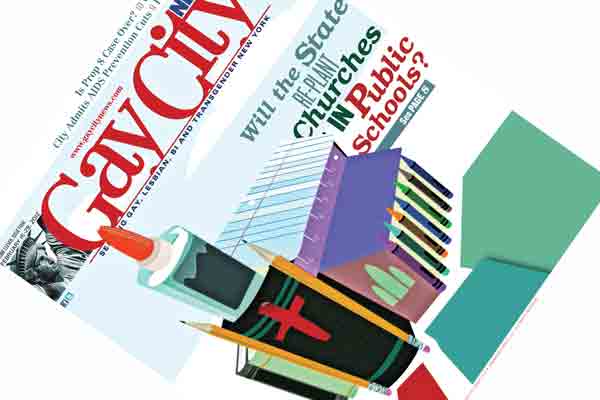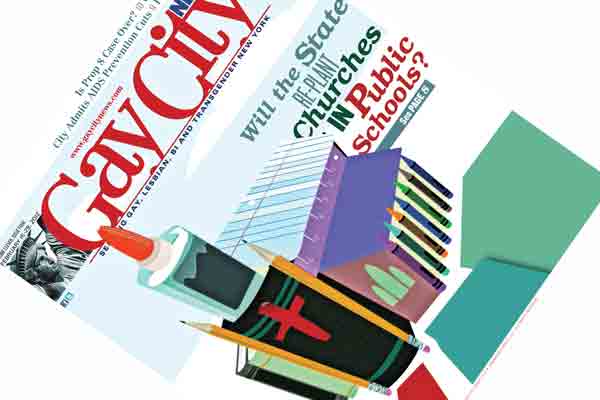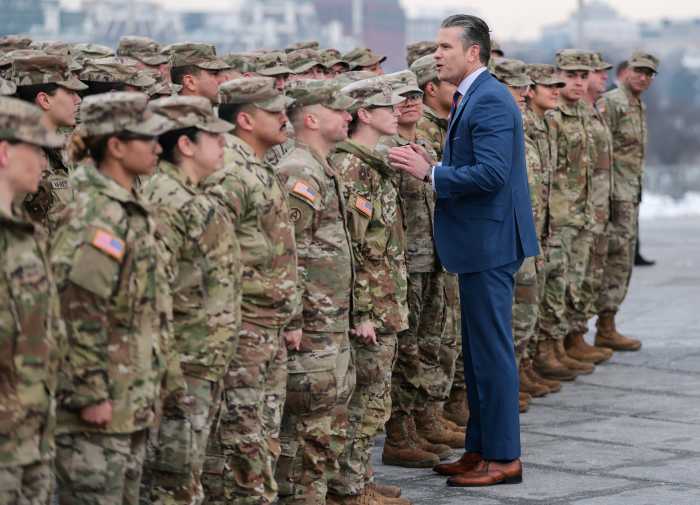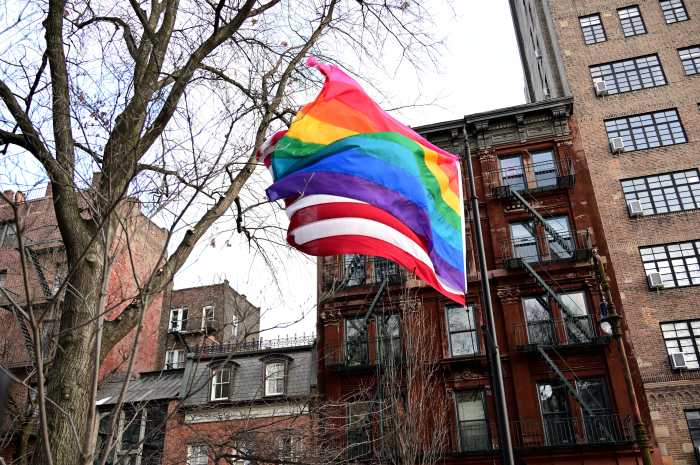Schools Chancellor Carmen Fariña and Mayor Bill de Blasio in late December. | GAY CITY NEWS
The US Second Circuit Court of Appeals once again upheld the constitutionality of a New York City policy barring religious organizations from using public school space for regular Sunday worship services.
The April 3 ruling overturned Judge Loretta Preska, the Southern District of New York’s chief judge, appointed by President George H.W. Bush, for the second time in litigation that has dragged on since 2001. Since that time, Preska has issued injunctions that have kept church services in the public schools.
In a 2-1 decision in Bronx Household of Faith v. Board of Education, the appeals court “rejects the District Court’s conclusion that the policy violates the Free Exercise and Establishment Religion Clauses of the First Amendment.”
Mayor's posture contradicts testimony his new chancellor made in 13-year-old court battle
The fundamentalist Bronx Household was represented by the right-wing Alliance Defense Fund, a group that frequently clashes in court with LGBT advocacy groups.
While Carmen Fariña, now schools chancellor, was the Department of Education’s (DOE) chief witness in support of the ban in 2005, Mayor Bill de Blasio has always opposed barring the churches from the schools, and, in the wake of the decision, said, “I stand by my belief that a faith organization playing by the same rules as any community non-profit deserves access. They have to go through the same application process, wait their turn for space, pay the same rent. But I think they deserve access.”
De Blasio then made an argument unrelated to the case decided by the Second Circuit, saying, “They play a very, very important role in terms of providing social services and other important community services.” The DOE policy only bars space rental for religious worship, not for non-religious charitable or social service activities by churches.
The Department of Education (DOE) would not respond to questions about whether Fariña stood by her testimony, saying through a spokesperson, “The mayor is commenting on the city’s behalf.”
The city’s Law Department, which normally sends out detailed press releases hailing its legal victories, did not do so in this case and would not answer questions about if and when the city would begin implementing its longstanding –– and long stayed –– policy now that the injunction has been lifted, also referring reporters to “remarks made by the mayor.”
The mayor’s office will not yet say whether he will seek to change the policy, which would pose a different question for the court. Art Eisenberg of the New York Civil Liberties Union (NYCLU) said that if the city did change the policy, “the court would be compelled to decide whether permitting worship gives the appearance of endorsement of religion and violates the Establishment Clause.” As it is, “the court has said it is reasonable for the city to fear” that it is such an endorsement.
Donna Lieberman, the NYCLU’s executive director, said in a written release, “This case is about a group of about 160 religious congregations that were dominating public schools across New York City Sunday after Sunday, year after year. When a school is converted to a church in this way, it sends a powerful message to students and the community at large that the government favors that particular church. Children who are not part of the favored congregation feel diminished, and both the church members and the community stop seeing the distinction between the church and the school. That hurts kids, that hurts people who aren’t members of the church, and that hurts one of our nation’s most cherished principles.”
The right wing has engaged in an explicit church-planting strategy, nationwide and in New York. | VINCE JOY
In her 2005 testimony, Fariña said, “Permitting worship services in DOE’s public schools violates the separation of church and state,” adding, “In this wonderfully diverse city, DOE seeks to avoid being perceived as endorsing or sponsoring any particular religion or congregation. Second, because of the school schedule, schools are not equally available for the main worship services for all religions –– thus, DOE or school officials may be perceived as favoring one religion over another. Finally, DOE is concerned about school officials becoming involved in religious matters, such as may occur when enforcing rules of general applicability which pertain to how permit-holders use school facilities, or in other circumstances relating to a congregation’s use of a school as its primary place of worship.”
Out gay City Councilman Daniel Dromm, who is now chair of the Council’s Education Committee, said, “I believe the chancellor should stand by her sworn testimony and that the court has made a correct decision. The city’s policy is constitutional and upholds the separation of church and state. The mayor should back down from further pressing the case. Enough has been said by the courts. Leave it be.”
While Dromm has been fighting to uphold the ban for years, his Council colleagues voted overwhelmingly last year to support a resolution, brought by Bronx Councilman Fernando Cabrera, an evangelical minister, to call upon the state to enact a law to “afford houses of worship equal access to school property.”
Only 11 out of 51 members objected to the resolution, including the gay and lesbian caucus of Dromm, Speaker Christine Quinn, Jimmy Van Bramer, now the majority leader, and Rosie Mendez. Melissa Mark-Viverito, the new Council speaker, and Gale Brewer, the new Manhattan borough president, were also among those who objected.
Letitia James, the new city public advocate who was then in the Council, is a big supporter of churches in schools.
The state has not, to date, enacted any law of the type Cabrera’s resolution called for.
In its decision, the appellate panel wrote, “The rule prohibiting religious worship services… did not exclude expression of a religious viewpoint. It was a content-based exclusion of a particular category of activity, which exclusion was constitutionally permissible in light of the Board’s reasonable and good faith belief that permitting religious worship services in its schools might give rise to an appearance of endorsement in violation of the Establishment Clause, thus exposing the Board to a substantial risk of liability.” (Arthur S. Leonard, Gay City News’ legal correspondent, will provide a more complete analysis of the decision.)
One of Bronx Household’s arguments was that it couldn’t afford space elsewhere. The space in the schools is practically free, but as the appeals court noted, “The Free Exercise Clause, however, has never been understood to require government to finance a subject’s exercise of religion.”
The court wrote that “religious groups that conduct worship services” are not excluded entirely from “the use of school facilities. They may use the facilities for the same purpose and in the same manner as the facilities are used by religions that do not conduct religious worship services,” an allusion to the use of schools by congregations engaged in non-worship charitable and social service activities.
Katherine Stewart’s 2012 book “The Good News Club: The Christian Right’s Stealth Assault on America’s Children” documented the massive “church planting” movement of right-wing churches aiming to claim space in public schools as a way “to convert children to fundamentalist Christianity and encourage them to proselytize to their ‘unchurched’ peers.”
Some of these right-wing, fundamentalist anti-gay churches have planted themselves in public schools in Greenwich Village and Chelsea.





































